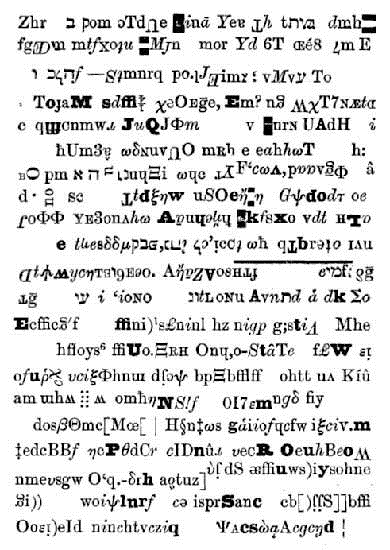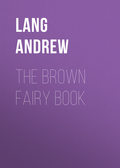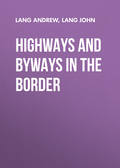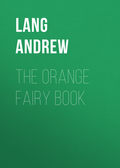
Lang Andrew
He
CHAPTER III.
LEONORA'S DISCOVERY
One wild winter night, when the sleet lashed the pane, my door suddenly opened. I started out of a slumber, and – could I believe my eyes? can history repeat itself? – there stood the friend of my early youth, her eyes ablaze, a cradle in her arms. Was it all coming round again? A moment's reflection showed me that it was not my early friend, but her daughter, Leonora.
'Leonora,' I screamed, 'don't tell me that you– '
'I have deciphered the inscription,' said the girl proudly, setting down the cradle. The baby had not come round.
'Oh, is that all?' I replied. 'Let's have a squint at it' (in my case no mere figure of speech).
'What do you call that?' said Leonora, handing me the accompanying document.

'I call it pie,' said I, using a technical term of typography. 'I can't make head or tail of it,' I said peevishly.
'Well, pie or no pie, I love it like pie, and I've broken the crust,' answered the girl, 'according to my interpretation, which I cannot mistrust.'
'Why?' I asked.
'Because,' she answered; and the response seemed sufficient when mixed with her bright smile.
'It runs thus,' she resumed with severity, 'in the only language you can partially understand —
'It runs thus,' she reiterated, and I could not help saying under such breath as I had left, 'Been running a long time now.'
She frowned and read —
'I, Theodolitê, daughter of a race that has never been run out, did to the magician Jambres, whose skill was even as the skill of the gods, those things which as you have not yet heard I shall now proceed to relate to you.
'Of him, I say, was I jealous, for that he loved a maiden inferior – Oh how inferior! – to me in charms, wit, beauty, intellect, stature, girth, and ancestry. Therefore, being well assured of this, I made the man into a mummy, ere ever his living spirit had left him. What arts I used to this last purpose it boots not, nor do I choose to tell. When I had done this thing I put him secretly away in a fitting box, even as Set concealed Osiris. Then came my maidens and tidied him away, as is the wont of these accursed ones. From that hour, even until now, has no man nor woman known where to find him, even Jambres the magician. For though the mummifying, as thou shalt not fail to discover, was in some sort incomplete, yet the tidying away and the losing were so complete that no putting forth of precious papyri into cupboards beneath flights of stairs has ever equalled it.
'Now, therefore, shall I curse these maidens, even in Amenti, the place of their tormenting.
'Forget them, may they be eternally forgotten.
'Curse them up and down through the whole solar system.'
'This is very violent language, my dear,' said I.
'Our people swore terribly in Egypt,' answered Leonora, calmly.
'But it is vain, no woman can curse worth a daric.10
'But for this, the losing of the one whom I mummied, must I suffer countless penalties. For I, even the seeress, know not what the said maidens did with the said mummy, nor do you know, nor any other. And not to know, for I want my mummy to have a good cry over, is great part of my punishment. But this I, the seeress, do know right well, for it was revealed to me in a dream. And this I do prophesy unto thee, my daughter, or daughter's daughter, ay, this do I say, that a curse will rest upon me until He who was mummied shall be found.
'Now this also do I, the seeress, tell thee. He who was mummified shall be found in the dark country, where there is no sun, and men breathe the vapour of smoke, and light lamps at noonday, and wire themselves even with wires when the wind bloweth. And the place where the mummy dwelleth is beneath the Three Balls of Gold. And one will lead thee thither who abides hard by the great tree carven like the head of an Ethiopian. And thou shalt come to the people who slate strangers, and to the place of the Rolling of Logs, and the music thereof.
'Thereafter shalt thou find Him, even Jambres. And when thou hast healed him the Curse shall fall from me!
'Nor, indeed, shall the unmummying be accomplished, even then, unless thou, O my daughter, or my daughter's daughter as before, shalt go with He-who-was-mummied to the Hall of Egyptian Darkness and sit in the Wizard's Chair that is thereby, even the seat which was erst the Siege Perilous. These things have I said, well knowing that they shall be accomplished.
'To thee, my daughter!
'Thy Grandmother.'
'There, Polly, what do you say to that?' said Nora.
'Your grandmother!' I replied.
'Polly!' said Miss Nora, looking at me with quite needlessly flashing eyes, 'you and I will set out on the search for this unhappy mummied one.'
'Don't you think the critics will call the motive rather thin?' I demurred.
'Thin, to rescue my ancestress from a curse!' said Leonora.
'There's just one other thing,' she mused. 'Shall we take a low comedy character this time, or not?'
'Let's take Ustâni,' I proposed, 'he can double the part with that of the Faithful Black! A great saving in hotel bills and railway fares.'
CHAPTER IV.
THE EQUIPMENT
After it had been decided that we should start in search of 'He who had been mummified alive,' the next step seemed to be to go. But Leonora demurred to this.
'We must have our things,' she said; 'what do you think we should take?'
'Scissors,' I replied; and I regret to say that at first she misinterpreted the phrase.
Leonora is a powerful as well as a pretty girl, and when the bear fight that ensued was over my rooms were a little mixed.
This suggested mixed biscuits, that invaluable refreshment of the traveller, and from one thing to another we soon made up a complete list of our needs.
The scissors, and skates, and the soap we procured at the Church and State stores,11 but not, of course, the revolvers. The revolvers we got of the genuine Government pattern, because both Leonora and I are dreadfully afraid of fire-arms, and we knew that these, anyhow, would not 'go off.' The jam we got, of course, at the official cartridge emporium, same which we did not shoot the Arabs. The Gladstone bag and the Bryant & May's matches we procured direct from the makers, resisting the piteous appeals of itinerant vendors. Some life-belts we laid in, and, as will presently be seen, we could have made no more judicious purchase.
As, from information received on a mummy case, we were travelling in search of a mummy, of course we laid in a case of Mumm, which was often a source of gaiety in our darkest hours. The wine was procured, as I would advise every African traveller to do, from Messrs. – .12
Being acquainted with the deleterious effects of a malarious tropical atmosphere, we secured a pair of overalls, advertised as sovran for 'all-overishness,' the dreaded curse of an African climate. These we got at the celebrated emporium of Messrs. – .13
Our preparations being now exhaustively completed, Leonora and I returned to Oxford, packed our things, and consulted as to the route which we should adopt.
CHAPTER V.
DOWN THE DARK RIVER
Down the Dark River, the mystic Isis, so Leonora had decided, we sped: Ustâni plying the long pole of the dhow, or native flat-bottomed boat, while we took it in turns to keep him up to his work by flicking him with a tandem-whip.
The moon went slowly down, and it occurred to Leonora to remark that we were 'going down' too, an unusual thing so early in term. Like some sweet bride into her chamber the moon departed, and the quivering footsteps of the Don14 shook the planets from their places, to the consternation of the Savilian Professor of Astronomy, who, as in duty bound, was contemplating these revolutionary performances from the observatory in the Parks. A number of moral ideas occurred to Leonora and myself, but out of regard for Ustâni's feelings we denied them expression. I began, indeed, to utter a few appropriate sentiments, but the poor Boshman exclaimed, 'You floggee, floggee, Missy, or preachee, preachee, but no both floggee and preachee – ' in a tone that would have disarmed a Bampton lecturer.
Down we drifted, ever downwards, obedient to the inscrutable laws of the equilibrium of fluids. Now we swept past the White Willow, now through the cruel crawling waters of the Gut, now threaded the calamitous gorge of Iffley, and then shot the perilous cataract of Sandford.
At this moment, just when the dhow was yet quivering with the strain, I noticed an expression of abject fear on the face of Ustâni. His dark countenance was positively blanched with horror, and his teeth chattered.
'Silence, chatterbox!' I cried, querulously perhaps, when he laid down his pole and seated himself in an attitude of despair.
'What's the matter, old boy?' asked Leonora, and the reply came in faltering accents —
'The Ama Barghîs!'15
We glanced in terror down the river's edge.
There, on the path trodden by so many millions of feet that now are silent,16 there were the burly forms of five or six splendid savages.
The character of their language – which was borne to us on the pure breeze of morning – their costume, their floating house, in which these scourges of the water highway commonly reside – everything combined to demonstrate that they belonged to the Barghîz, the most powerful and most dreaded of the native populations.
'Me umslopogey,' whispered Ustâni in his native language, meaning that he would retreat.
'Eyes in the boat,' cried Leonora, in her clear, commanding tones; 'paddle on all!'
The Boshman, cowed by her aspect, and the mere slave of discipline (he had pulled in the St. Catherine's second torpid), obeyed her command, and presently we were abreast of the Barghîz.
'Hi, Miss,' cried the Barghî chief, a man of colossal stature, 'Can't yer look where yer a shovin' to?'
Though his words were unintelligible, his tone was insulting.
Leonora rose to her feet, and to the occasion.
By virtue of her rare acquaintance with savage customs, she was able to taunt the Barghîz with the horrors of their tribal mystery, to divulge which is Death!
She openly insulted the secret orgies of the tribe.
She denounced the Dog-Feast!
'Who ate the puppy pie under Marlowe Bridge?' shrilled Leonora in her proud sweet young voice.
In a moment a shower of stones struck the dhow, and spurred the water into storm. Frank Muller, the Barghî chief, distinguished himself by the fury of his imprecations and the accuracy of his aim. A smothered groan told me that Ustâni had been hit in the mouth.
Whid, whad, crash went the stones, while Leonora plied the pole with desperate energy, and I erected the patent reversible umbrellas with which we were provided to catch any breath of favourable wind.
The fierce rapidity of the stream finally carried us out of the reach of the infuriated Barghîz (who, moreover, were providentially slain by lightning – a common enough occurrence in that favoured climate, where nobody thinks anything of it), and we rested, weary and wounded, in a sheltered backwater.17
'The dhow's looking rather dowdy,' said Leonora, glancing at the shattered craft.
'If doughty deeds my lady please,' said I, catching her light tone, 'why, she must take the consequences. But, Leonora,' I added, shuddering, 'I'm sure my feet are damp.'
If there is one thing I dread it is damp feet.
'No wonder,' said Leonora, calmly. 'The dhow has sprung a leek.'
I searched the dhow everywhere, but could find no trace of the vegetable.
Meanwhile the water had risen above the capstan, and Ustâni, shivering audibly, had perched himself on the bowsprit.
'Now or never,' said Leonora, 'is the moment for our life-belts.'
We hurriedly put on our life-belts, regretting the absence of an experienced maid.
'I'll be Mrs. Lecks, and you'll be Mrs. Aleshine!' laughed Leonora, as the dhow, shuddering in all her timbers, collapsed.
'Ego et Lecks mea!' cried I, not to seem deficient in opportune gaiety of allusion, and we were in the water. We advanced briskly down stream, Ustâni propelling himself with the pole of the dhow.
Ever anxious about Ustâni's University education (interrupted by this expedition), Leonora kept 'coaching' him in the usual way.
'Bow, you're feathering under water,' she exclaimed, when the unfortunate Ustâni disappeared in a lasher, where we, thanks to our life-belts, floated gaily enough.
Here we paused to catch a few of the perch and gudgeons, which Leonora had attracted by carefully wearing white stockings.
'Nothing like white stockings for perch,' she said.
As there were not perch enough to go round, Ustâni was told to content himself with the pole, a synonym, if not an equivalent.
Laying our trencher-caps on the water, we used them, as of old, for trenchers, and made an excellent meal.






